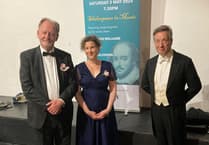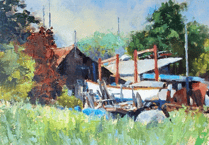There was a rich display of creative talent on show at the 2024 Festival of Young Composers run by the Petersfield Musical Festival.
Entries ranged from works for solo piano or solo violin right up to an ambitious score for full symphony orchestra.
The competition was held on February 4 at the Studio at the Petersfield School and drew a large public audience of well-wishers and aspiring young musicians.
This is the eighth young composers’ competition administered by PMF. The cash prizes – of up to £200 – are funded by donations to the Michael Hurd Fund which established in memory of the local composer.
Young musicians were allowed to submit entries digitally as well as perform them live in the studio.
The adjudicators were festival president Jonathan Willcocks, a well-known composer and conductor who recently received a BEM for his services to music; Dr Jill Jarman, a composer and lecturer at Chichester University; and festival music director and former director of studies at Bedales School, Philip Young.
All three made constructive and supportive comments about the works presented, giving tips for improvement and development, as well as allowing the composers to explain their works and inspiration in a way that shed light on the creative process.
William Sharps won first prize with his Variations on an Original Theme for solo violin in the 14 years and under category (live performance). Jonathan Willcocks praised William’s idiomatic writing for his instrument and ability to elaborate on the original theme while keeping the same implied harmony. He also complimented William’s excellent performing skills and command of the violin.
Runner-up in this category was Jude Gillham’s The Painter’s Burden for solo piano. Philip Young commented on the effective use of left hand ostinato and was intrigued by the piece’s title, which implies a lamentoso sadness and picturesque quality without referring specifically to a particular painting. He gave advice on developing bridge passages between sections and writing an accurate score which others could read without ambiguity.
Joe Jolliffe had created an extremely impressive full symphonic score called Symphonic Prelude using computer software which won the top prize in the under-17 recorded category. Jonathan Willcocks joked that Joe had “no concern about money” because the score called for huge forces including exotic instruments such as a celeste and pipe-organ: in reality this would probably be too expensive to perform. However, Joe’s composition demonstrated a sophisticated understanding of orchestration, musical colour, themes and textures and his effort deservedly won first prize.
Highly commended in this category was Ava Groves’ The House Shakes When Trains Go By for voice and guitar. Jill Jarman described Ava as a “brilliant lyricist” and commented on the extra demands of writing words as well as musical notes. She also complimented her on the way the song “hooked us in”. Ava explained that the title was metaphorical, referring to emotions rather than living next to a railway line!
Finally, Laurence Horwood took the honours in the 17 and under live performance category with his outstanding quartet for flute, clarinet, violin and cello called Song of an Age. Jill Jarman praised the composition’s mature interplay of instruments which seemed to be in conversation together. The piece was very engaging and had an overall string resonance with motifs in the woodwind dancing at the top of the texture.
The four players performed in an assured and collaborative way, and showed real chemistry as an ensemble.
William Hammond’s Winter Dreams for solo piano was commended for its expressive quality, virtuosic and idiomatic writing for piano and excellent structure with smooth transitions between sections.
Summing up, Philp Young commented: “All the pieces we have heard take us on an imaginative journey. Today we are celebrating composing as a musical and creative achievement.”
One common theme to emerge amongst all the judges’ comments was the need for the score to reflect the music accurately. The point of notating music, rather than improvising it, is so that others can play it. This involves writing explicit musical directions such as tempo, style markings, phrasing, and bow or tonguing marks that are clear and unambiguous.
The winning pieces in the live performance category will be performed at the Youth Concerts during the upcoming festival in Petersfield Festival Hall.
For further information and to book, visit: www.petersfieldmusicalfestival.org.uk





Comments
This article has no comments yet. Be the first to leave a comment.